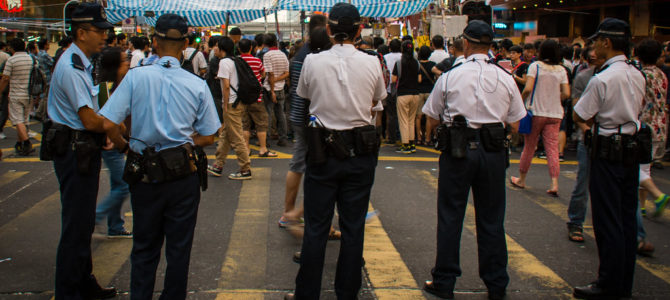
Last Sunday, more than 1 million Hong Kong residents, despite brazing heat, took to the streets to protest the government’s controversial extradition bill. Should this bill become law, Beijing will be able to demand Hong Kong authorities extradite anyone, including pro-democracy dissidents and human rights activists.
The Sunday protest is the largest since the United Kingdom handed Hong Kong over to Beijing in 1997. The protest was peaceful until midnight, when a small group of protestors clashed with local police. For an event involving 1 million people, a mostly pacifist protest is a no small accomplishment.
In some way, Sunday’s protest feels like Hong Kongers’ Alamo moment. Carrie Lam, Hong Kong’s chief executive appointed by Beijing, vowed the day after the massive protest that she would push ahead with the extradition bill in spite of dissent. She probably doesn’t have much choice, because Beijing won’t allow her to back down. Since 1989, Beijing has always suppresed any dissent immediately and ruthlessly.
Hong Kongers Want to Keep Their Freedoms
But Hong Kongers won’t back down either. More protests are taking place this week. What’s amazing is that, unlike 2014’s “umbrella movement,” which demanded universal suffrage, there is no single visible leader like Joshua Wong who is in charge of this week’s protests. Instead, ordinary Hong Kongers—students, airline crews, office workers, labor union organizers, Catholic Church workers, business people, and even some legislators—are taking part in these protests of their own initiative.
Teachers’ unions called for closing schools on Wednesday so teachers and students could participate in the protest. Art galleries, restaurants, and many other businesses gave their employees a day off so they could join. These grassroots efforts demonstrate that the protest isn’t only about opposing the extradition bill. Hong Kongers are fed up by the constant economic and political squeeze by Beijing. They feel that Beijing has broken its promise of respecting Hong Kong’s autonomy. They are also deeply disappointed in Hong Kong authorities’ submissive attitude. Now, ordinary Hong Kongers are showing they won’t go down without a fight.
Protesters have surrounded Hong Kong’s legislative building since Tuesday, which forced the pro-Beijing legislature to temporarily delay the second round of debate of the bill. However, the Hong Kong government’s responses to the peaceful protests have become more hawkish.
The legislature resumed the debate of the extradition bill on Wednesday. Lam called the protests “riots,” which reminded people of the language Beijing used against the 1989 pro-democracy protest in Tiananmen Square. The latest video shows Hong Kong police are firing rubber bullets and tear gas into the crowd. According to a government report, more than 70 people, including both police and protesters, were injured during the clash.
The most likely outcome of this extraordinary event in Hong Kong is that the legislature will pass some version of the extradition bill. So are Hong Kongers’ efforts futile? I don’t think so.
The protests in Hong Kong accomplish at least two things. For one, the maturity and dignity that Hong Kongers are demonstrating while protesting, as well as their devotion to political freedom, serve as a powerful rebuttal to Beijing’s assertion that western democracy is incompatible with Chinese people and culture. According to Beijing, Chinese people can only achieve prosperity and security under an authoritarian regime. Hong Kongers can proudly point to the political freedom and prosperity they have enjoyed under a free-market economy, and remind the world of how ridiculous Beijing’s assertion is.
Beijing’s Credibility Tarnished Over Broken Promises
Second, when the extradition bill does become law, this week’s protests will cast a long shadow on Beijing’s credibility. If Beijing can’t keep the promise it made to Hong Kong, should the rest of the world trust anything Beijing says?
Is the “Belt and Road” initiative really an altruistic infrastructure program? Should we trust that island building in the South China Sea is innocently about fishing, as China has claimed? Should we really expect that if the United States and China sign a trade deal, Beijing will stop stealing technological secrets from U.S. firms? Sure, Beijing will win this fight in Hong Kong, but it will lose its credibility in the long run.
Hong Kongers are standing up for their rights and their future. The rest of the world needs to stand with them. Some have already done so. Sen. Marco Rubio tweeted:
#China has already jailed innocent foreign business executives as retribution against other countries. If #HongKong legalizes the kidnapping of people who disagree with Beijing it will have a devastating effect on their economy https://t.co/b2I99cKbHN
— Marco Rubio (@marcorubio) June 11, 2019
In a statement, House Speaker Nancy Pelosi said, “The extradition bill imperils the strong US-Hong Kong relationship that has flourished for two decades. If it passes, the Congress has no choice but to reassess whether Hong Kong is ‘sufficiently autonomous’ under the ‘one country, two systems’ framework.”
Trump’s Unusual Silence Should Be Broken
President Trump has been uncharacteristically silent about Hong Kong’s protests. Maybe he doesn’t want to jeopardize the U.S.-China trade negotiations.
Someone should remind him of a history lesson: the world, including the United States, gave Beijing a pass after it brutally suppressed peaceful pro-democracy protestors in Tiananmen 30 years ago, hoping economic engagements would turn China into a more open and tolerant society. Thirty years later, that strategy has proven to be a failure. China has become a powerful authoritarian and competes against the United States in every field. The United States has much less leverage to confront and contain China today; we can’t afford to make the same mistake again.
Two years ago, President Trump spoke at the South Korea Assembly with these words, “the strength of the nation does not come from the false glory of a tyrant. It comes from the true and powerful glory of a strong and great people.” A million strong and great Hong Kongers are taking a stand for freedom this week. Will the American president stand by them?









